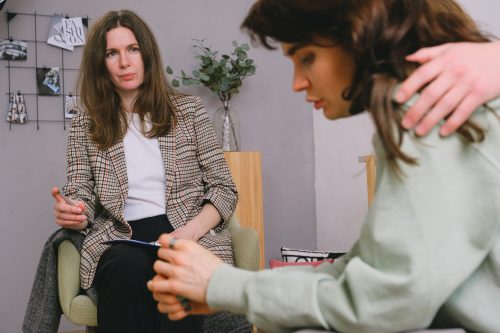Resolving to get therapy is a difficult decision and always a brave one. It takes a lot of courage for someone to reach out and seek the help they need finally. It’s nerve-wracking enough already — even more so when you have no idea what to expect. Not knowing hinders a lot of people from deciding to get help.
When making that choice, there are always doubts. What will other people say? What if my therapist doesn’t understand? What if they can’t help? What if they judge me? These thoughts might plague your mind. But simply knowing what to expect could change your perception and ease your fears a little bit.
1. Be Proud Of Yourself
Getting therapy is scary, but just by deciding to seek out help, you’ve already made an enormous leap to getting better. The first step is always the hardest. So pat yourself on the back. Take some time to appreciate the decision you just made.
2. Take Your Time
It’s crucial to find a therapist that fits you. You need one that you can trust and be comfortable with, so you can make the most out of your sessions. Meeting with a therapist that makes you want to put your guard up will cause more harm than good.
Know that you don’t have to go for the first referral or the first therapist you find. Take time to search and narrow down your options.

3. Reflect On Your Thoughts
What’s troubling you? Why did you decide to seek therapy? What do you want your therapist to help you with?
Write down your thoughts, so you know what you want to bring up. Of course, it’s okay if you don’t know what you want to talk about. Maybe you don’t know what the problem is exactly. That’s what your therapist is there for. It’s their job to lead the conversation and sort out your messy thoughts, so don’t feel pressured if you don’t know what to say.
It’s still helpful to write down what’s bothering you, no matter how disorganized or minor it might seem. You can also write down questions you might want to ask. Also, remember to make a list of medications you’re currently taking; your therapist will want to know this.
4. Set Realistic Expectations
Your problems won’t disappear in a puff of smoke with just one trip to a therapist. That’s perfectly fine. Progress takes time, so don’t rush yourself.
If you feel that you left something out during your session, don’t be too hard on yourself. Remember that there’s always the next one. Jot your thoughts down, so you remember to bring them up next time.
5. Show Up Early
Make it a point to create a cushion of time before and after your session. Opening up might take more time than expected, and understandably so! It’s normal to feel emotional in therapy, so feel free to let it all out.
Showing up early also helps drop your heart rate and blood pressure. When you’ve had the chance to sit down and relax, you’ll enter your session with a calm, clear mind.

6. Don’t Be Afraid To Open Up
You might feel that it’s unnecessary to talk about the trivial things bothering you, like not wanting to do the dishes. But this is far from the truth.
As you talk with your therapist, be open. You might realize that there’s something you wanted to talk about after all; you didn’t consider it because you thought it was inconsequential. It might seem minor or pointless to you at first, but your therapist will know what to do with the information that you give them.
7. Be Honest
You might feel that what you have to say is foolish or nonsensical and that your therapist will laugh at you. But keep in mind that your therapist has your best interests at heart.
Communicate with your therapist. Pour out your thoughts and emotions. Also, be candid with them if they do or say something you disagree with or feel offended.
For your first session, your therapist will likely want to get to know you better. Don’t be afraid to ask and be asked. Be open and honest with your therapist. Help them help you.
8. Expect To Feel Awkward At Times
Sharing your feelings and opening up to a total stranger is difficult. You might feel uncomfortable and awkward, especially if you’re more reserved. Just know that it’s part of the process. It takes time to adjust to therapy. When you do feel that way, don’t be too hard on yourself.

9. Take Comfort In The Fact That Everything Is Confidential
Most worries surrounding therapy come from the fear of being judged or laughed at. But you don’t have to be anxious about this.
Your therapist is there to help you. Everything you say during your session will be kept under wraps. Your feelings, emotions, thoughts, secrets — everything will be used only to find solutions to your problems and help you get through your concerns.
10. Listen To Your Gut
If you find that you’re not too fond of your therapist, that’s perfectly fine. One bad therapy session is not the end all be all. Not all your meetings with your therapist will feel that way. So don’t lose hope.
However, if you feel like it will be in your best interest to seek another therapist, let the other party know immediately. Likewise, don’t feel bad for wanting to find another therapist. You’re not a bad person for wanting to find someone you’re more comfortable with, so don’t feel so guilty and force yourself to keep going with a therapist you don’t trust. It’s counterproductive, and it will only backfire on you.
The First Step To Getting Better
There’s still a lot of stigma around therapy, but don’t let yourself get swept by them. In the end, judgmental opinions will never be more important than your health.
The bottom line is that you don’t need to feel anxious or pressured when going to therapy. You could walk into therapy with nothing in mind and find that once you start talking, your thoughts will spill out unconsciously and effortlessly.
By seeking out help, you’ve already made the biggest step. All that’s left to do now is open up to your therapist, don’t lock your thoughts up, and put in the work outside your sessions. Therapy isn’t going to be easy, but it’s going to be worth it.